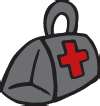 Crashes in which the driver falls asleep are most common among young male drivers. In one large study, more than 50% of fall-asleep crashes involved a driver 25 or younger. Drowsy driving is a significant problem. In a national 2009 poll, 28% of respondents reported that they drive while drowsy at least once a month.
Crashes in which the driver falls asleep are most common among young male drivers. In one large study, more than 50% of fall-asleep crashes involved a driver 25 or younger. Drowsy driving is a significant problem. In a national 2009 poll, 28% of respondents reported that they drive while drowsy at least once a month.
Sleep is actually an active process. Although your metabolic rate slows and your body does get rest, some brain activity increases dramatically. In REM sleep, many parts of the brain are as active as they are during wakefulness. During sleep, the brain is “recharged.” In addition, your endocrine system secretes larger amounts of certain hormones during sleep, such as growth hormone. In the “deep sleep” stages, your body experiences the most restorative effects of sleep.
Poor sleep impairs the body’s ability to use insulin, which can eventually cause diabetes. One study found that people who get fewer than six hours of sleep are prone to abnormal blood sugar levels. Several hormones that regulate the body’s use of energy are released during sleep. Too little sleep, or interrupted sleep, can disrupt this process.
Usually, blood pressure decreases while people sleep, but interrupted sleep can interfere with this normal reduction, paving the way for high blood pressure and cardiovascular problems.
Chronic lack of sleep can cause fatigue, lethargy, and irritability. It can even contribute to depression. Such mood changes can create problems in your relationships. In one national survey, 20% of respondents said that they had lost interest in sex because they were too sleepy. An additional 14% said they missed family and work functions, as well as leisure activities, because of sleepiness.
There is also a link between poor sleep and weight gain. Scientists have discovered that sleep loss can boost appetite by altering the behavior of hormones that regulate metabolism, such as leptin and ghrelin. As a result, sleep-deprived people may have more cravings for foods rich in calories and carbohydrates, leading to increased weight.
Now you know!

